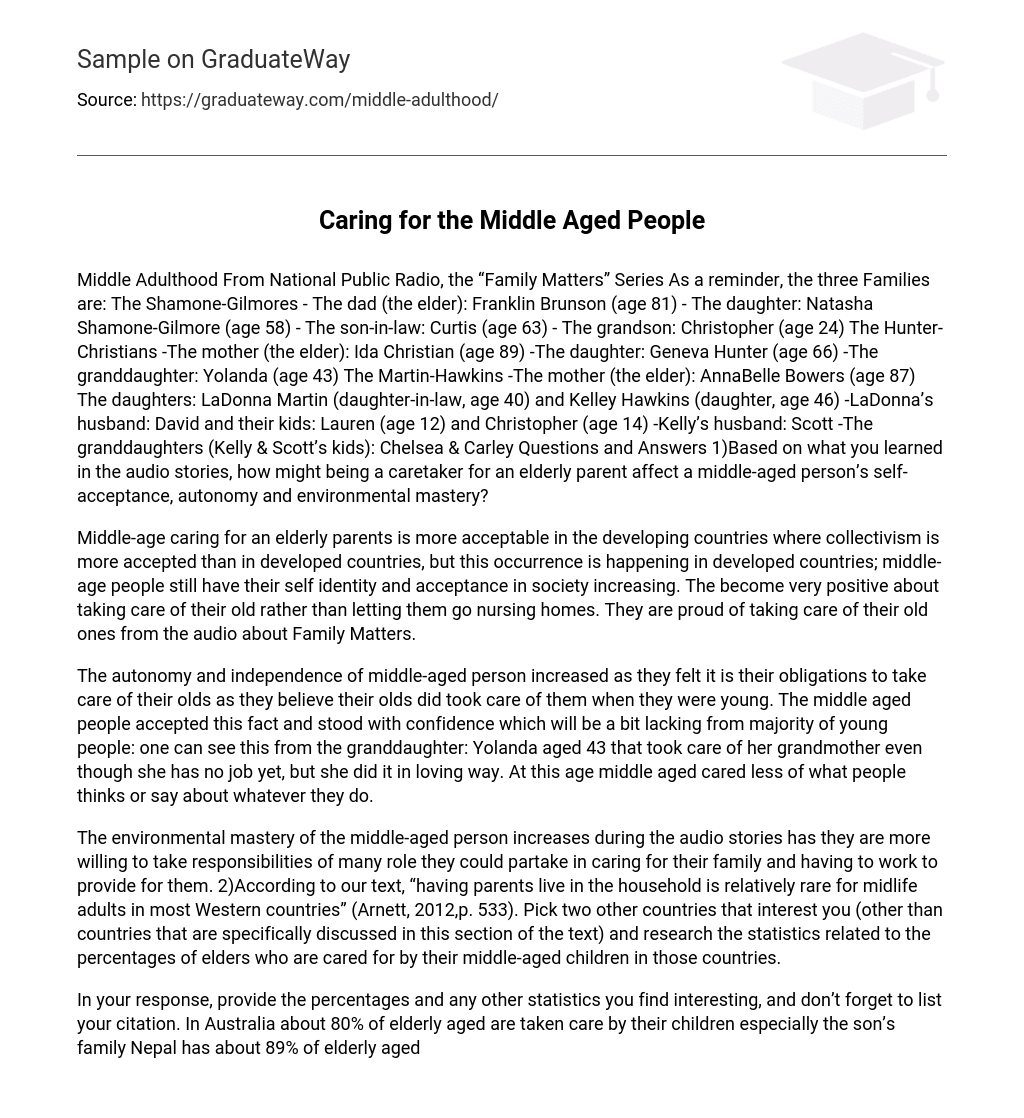Based on what you learned in the audio stories, how might being a caretaker for an elderly parent affect a middle-aged person’s self-acceptance, autonomy and environmental mastery?
Middle-age caring for an elderly parents is more acceptable in the developing countries where collectivism is more accepted than in developed countries, but this occurrence is happening in developed countries; middle-age people still have their self identity and acceptance in society increasing. The become very positive about taking care of their old rather than letting them go nursing homes. They are proud of taking care of their old ones from the audio about Family Matters.
The autonomy and independence of middle-aged person increased as they felt it is their obligations to take care of their olds as they believe their olds did took care of them when they were young. The middle aged people accepted this fact and stood with confidence which will be a bit lacking from majority of young people: one can see this from the granddaughter: Yolanda aged 43 that took care of her grandmother even though she has no job yet, but she did it in loving way. At this age middle aged cared less of what people thinks or say about whatever they do. The environmental mastery of the middle-aged person increases during the audio stories has they are more willing to take responsibilities of many role they could partake in caring for their family and having to work to provide for them.
According to our text, “having parents live in the household is relatively rare for midlife adults in most Western countries” (Arnett, 2012,p. 533). Pick two other countries that interest you (other than countries that are specifically discussed in this section of the text) and research the statistics related to the percentages of elders who are cared for by their middle-aged children in those countries.
In your response, provide the percentages and any other statistics you find interesting, and don’t forget to list your citation. In Australia about 80% of elderly aged are taken care by their children especially the son’s family Nepal has about 89% of elderly aged taken cared by their children as most of the population lived in the rural area. In Nigeria about 96% of elderly aged is taken care of by their children, both the daughter and son of the elderly do this or the elderly could live with eldest son while the other children can visit for support.
Nigeria culture valued elderly aged adults to be cared for by their children and the eldest son is placed in position to do this duty but if the elderly has only daughters the eldest will take care and this is acceptable both in the rural and urban areas of the country. Reference: The Effect of Child Care and Elder Care on the Standard of Living by Kijong Kim and Rania Antonopoulos.
In which of Erikson’s stages are the caretakers in the audio stories? Explain how the respective caretakers’ roles fit in to the “crisis” represented by this stage of Erikson’s theory.
The care takers are in generativity versus stagnation stages. The care take roles fit in to this as they wanted to do something for their family and society in believe that they contributed to the well being of the generations as they care for their old folks (generativity stage); rather than allowing them to be at the nursing homes where caring would not be as the ones given by their immediate family. The care taker might have just left the old folks in the nursing homes caring less of what might had happened as they will fade off and die one day.
Thus, the caretaker did not follow the past step as that will be focusing on narrow self interest without concern for the good of others or family(stagnation).
Discuss three different types of stresses caretakers within this age group might experience based on their roles within the “Sandwich Generation”. Give specific examples.
The caretakers from the story or the middle-aged care giver have financial issues as from the story it shows the middle aged will have to care for their own children that are in school and keeping up with expenses like mortgage, car loan’
The sandwich Generation has increased the stress and pressure(due to financial decisions) each middle aged person faces in making the family go on with the everyday norms of life. After financial stress, there are emotional stress encountered by care taker as they feel their old folks are fading off and might one day not breath as in the story the Hunter Christians family; Ida Christian having dementia, the condition will not improve as this is an old age disease, due to this the care taker will always have emotional anxiety of the sick conditions.
The third stress a caretaker would have within the Sandwich Generation will be High blood Pressure, this stress will just come up as the care giver thinks about many issues about the elderly unimproved health as was mentioned in the story when asked Geneva Hunter about her mothers health and what the doctor said to her; in case her mother falls she felt till when that time comes she will still care for her mother in her house. Such situations makes care takers blood rise gradually as they know the elderly health will never be improved but diminishes with time.





